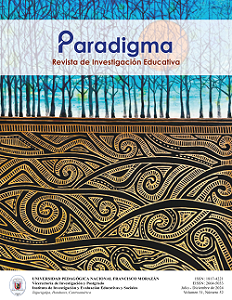Risk of addiction to social networks and the Internet of secondary education students
DOI:
https://doi.org/10.5377/paradigma.v31i52.19493Keywords:
teen, student, social networks, Internet, addiction, nomophobiaAbstract
This study aims to analyze the risk of addiction to social networks and the Internet (SNI), as well as the associated symptoms of addiction, social usage, geek traits, and nomophobia among secondary education students at the selected educational center. The research employed a quantitative approach with a non-experimental, cross-sectional, descriptive design. Data was collected using the Social Networks and Internet Addiction Risk Test, which consists of 29 items. The results revealed that students exhibit a moderate risk of addiction to SNI. This risk is primarily influenced by easy access in various environments, significant time spent on these platforms, and their usage during study and leisure periods. The main reasons for using these platforms include instant communication and social interaction. However, students displayed a low risk of engaging in behaviors linked to explicit content and exhibited symptoms of nomophobia, as the majority do not demonstrate excessive anxiety when separated from their devices.
Downloads
491
Downloads
Published
How to Cite
Issue
Section
License
Copyright (c) 2024 Universidad Pedagógica Nacional Francisco Morazán

This work is licensed under a Creative Commons Attribution-NonCommercial-NoDerivatives 4.0 International License.
Transfer of Copyright
- The author, when sending the work, states that it is his will to give the Universidad Pedagógica Nacional Francisco Morazán the patrimonial rights that correspond to him as the author of his work.
- The rights here assigned include all economic rights (Reproduction, transformation, public communication and distribution) and are given without limitation in terms of territory; This Assignment is given for the entire duration term established in the current legislation in Honduras.
- The cession of the aforementioned rights does not imply the cession of moral rights over it, because in accordance with the provisions of the Copyright and Related Rights Law, Chapter II, of the Moral Rights, Article 34, Article 25 , these rights are inalienable, imprescriptible, indefeasible and inalienable.
- The research work or document must be original and have been done without violating or usurping rights of third parties, therefore, the work is exclusively authored and owns the same.
- In the case of any claim or action by a third party, as to copyright on the work in question, the author must assume full responsibility for the rights assigned.
- Upon completion of the Rights Assignment Form, the author states that the work has not been published in another way, that the rights on the work have not been assigned and that no encumbrance or limitation on their use or use is imposed on them.





